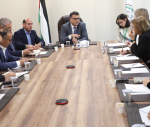You are here
‘The Tumultuous Decade’
May 18,2020 - Last updated at May 18,2020
On May 20, the Middle East Institute will release my new book “The Tumultuous Decade,” a book that brings together a decade of Zogby Research Services (ZRS) of Arab, Turkish and Iranian public opinion. What follows is a discussion of the background of and themes discussed in “The Tumultuous Decade.”
The second decade of the 21st century began with two traumatic events that would transform the Middle East. In fact, although the seeds had been planted years earlier, 2011 proved to be a watershed year for the people of the region. That year, the United States hastened, as promised, its withdrawal from Iraq, leaving behind a chaotic sectarian minefield ripe for Iranian exploitation. Also, 2011 witnessed the beginnings of what came to be known as the “Arab Spring.”
The intervening years have not been kind to many of the region’s peoples. In the aftermath of the US withdrawal, Iraq, left in the hands of a sectarian government led by Prime Minister Nuri al Maliki, descended once again into civil conflict with the increasingly disenfranchised Sunni Arab population reacting negatively to the Maliki government’s deeply divisive policies. This planted the seeds of resentment that ultimately spawned the phenomenon known as Daesh.
At the same time, Iran, which had once seen its regional ambitions held in check by Iraq, working through allied Iraqi sectarian political parties and militias, now gained a foothold in that country. With Iraq crippled by conflict, Iran was further emboldened to flex its muscles by aggressively pursuing a meddlesome and destabilising regional agenda, intervening in Syria, Bahrain and Yemen. While these dynamics were roiling the Gulf and Arab East, the uprisings that unsettled Tunisia, then Egypt and later Syria, would come to wreak havoc across North Africa and the Levant.
Since 2011, we have been given the opportunity to poll public opinion across this region in an effort to understand how its peoples have viewed these dramatic events. Each year we have surveyed Arab, Turkish, and Iranian attitudes for the Sir Bani Yas Forum (SBY) hosted in the United Arab Emirates (UAE). Topics we have covered in our annual SBY polls have looked at a wide range of issues including: the region’s major conflicts in Iraq, Syria and Yemen and how Syria’s neighbours are dealing with the refugee crisis spawned by that conflict; the role major external and local players have had in regional affairs, focusing on the United States, Russia, Iran, Turkey, and Saudi Arabia; how the Arab public has reacted to the “Arab Spring” and what impact these events have had on their attitudes and aspirations; Arab attitudes toward the increasingly worrisome phenomena of politicised religious groups from the Muslim Brotherhood to Al Qaeda; changing perceptions of the threat posed by Iran; and how the Arab public views the continuing Israeli-Palestinian conflict.
What our polling across the Middle East has taught us during this tumultuous decade is that Arab public opinion matters. Arabs know what they want and what they do not want. They want their basic needs for jobs, education and healthcare to be attended to, and they want good governance and protection of their personal rights.
It is the failure to address these core issues that have so riled publics from Egypt, Tunisia, Yemen and Syria early in the decade, and then Lebanon, Iraq, Algeria, Sudan and Iran at the decade’s end.
While Arabs, in particular, are focused on matters close to home, at the same time they continue to care deeply about the denial of legitimate rights and the suffering of other Arabs, whether in Palestine, Syria, Iraq, or Yemen. They are increasingly concerned with Iran’s nuclear program and its regional meddling, with this concern being especially noteworthy in Lebanon and Iraq.
And from our polling across the region we learn that Arabs are seeking consistency from US policymakers, even if they no longer believe it is possible. And as much as they want the United States and other external powers to support their aspirations, they also want these powers to avoid meddling in their internal affairs.
Finally, Arabs want their faith to play its rightful role in their lives and strong majorities reject its being weaponised or politicised. And as we found in our 2019 poll, Arabs retain a strong desire for intra-Arab cooperation. Respondents told us that their two top priorities in the next decade are more investment in the creation of a more prosperous and stable Arab World and greater political unity among Arab states. Polling results show that these are the unifying constants that shape Arab public opinion. These priorities have survived the unsettling upheavals of the past decade and, we believe, will continue to survive into the next.
While much of what will develop across the Middle East and North Africa in the next decade will no doubt be impacted by the fall-out of the Coronavirus pandemic, the stage has been set by the unsettling realities that have so roiled the region during this past tumultuous decade.
The writer is president of the Washington-based Arab American Institute












